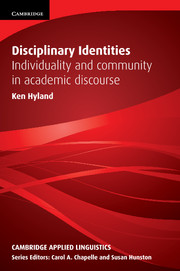Book contents
- Frontmatter
- Contents
- Series editors’ preface
- Preface
- Acknowledgements
- Notes on corpora and abbreviations
- 1 Identity: Interaction and community
- 2 Discipline: Proximity and positioning
- 3 Investigating identity
- 4 Identity in representational genres
- 5 Self-representation in academic bios
- 6 Culture: Authority and visibility
- 7 Reputation: Individuality and conformity
- 8 Gender: Disciplinarity and positioning
- 9 Identity, disciplinarity and methodology
- Appendix: Items with potential metadiscourse functions
- References
- Name Index
- Subject Index
3 - Investigating identity
Published online by Cambridge University Press: 09 February 2023
- Frontmatter
- Contents
- Series editors’ preface
- Preface
- Acknowledgements
- Notes on corpora and abbreviations
- 1 Identity: Interaction and community
- 2 Discipline: Proximity and positioning
- 3 Investigating identity
- 4 Identity in representational genres
- 5 Self-representation in academic bios
- 6 Culture: Authority and visibility
- 7 Reputation: Individuality and conformity
- 8 Gender: Disciplinarity and positioning
- 9 Identity, disciplinarity and methodology
- Appendix: Items with potential metadiscourse functions
- References
- Name Index
- Subject Index
Summary
In the first two chapters I have introduced the key notions of identity and discipline and elaborated something of their complexities and connections with each other. I have discussed how discourse, the ways we use language to interact with those around us, is a significant marker of both who we are and the groups we belong to. The question arises, however, of how we actually unpack this: what methods best reveal the processes that make people who they are? All discoursal approaches regard texts as evidence of identity – they see people representing who they are to each other through language – but each understands this in different ways.
Benwell and Stokoe (2006: 29) point out that a discursive view of identity can be viewed as a construction in interaction or as a historical set of regulatory structures. In current practice, these broad distinctions translate into three main approaches to the study of identity: Conversation Analysis (CA), Critical Discourse Analysis (CDA) and Narrative Analysis (NA). All three agree that identity is available for investigation through language and that individuals draw on understandings of institutional and social contexts to shape and interpret their interactions. They diverge, however, on what counts as data, on the interpretive activities of the analyst, and on whether it is legitimate to assume the influence of any particular role or relationship unless it is taken up in the talk. In this chapter I explore these key issues and illustrate what each approach brings to the study of identity. I will then go on to show how corpus techniques, by providing evidence for both collective proximity and individual positioning, contribute something new to this picture.
Negotiating identities: Conversation Analysis
Conversation Analysis follows Garfinkel’s (1967) insight that social life is a continuous display of people’s local understandings of what is happening. Analysts therefore reject any a priori categories to data and argue that everything we need to know about how identity is accomplished in talk can be discovered by studying the fine detail of everyday interaction. Identity is part and parcel of talk and not something that analysts impose through their interpretations of it.
- Type
- Chapter
- Information
- Disciplinary IdentitiesIndividuality and Community in Academic Discourse, pp. 45 - 70Publisher: Cambridge University PressPrint publication year: 2012



